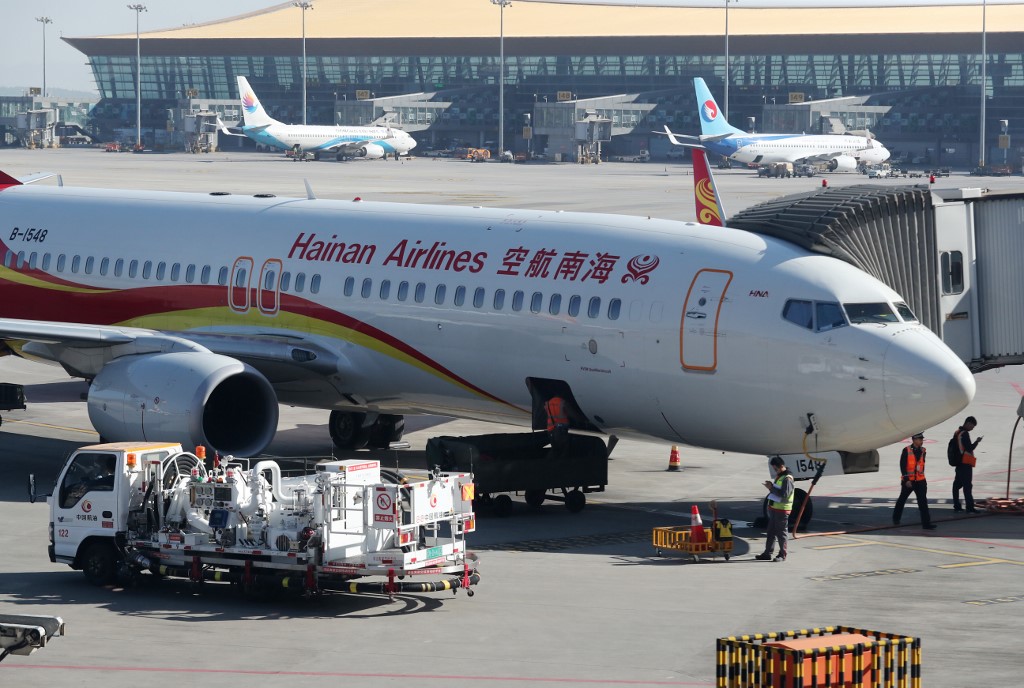(ATF) The once high-flying Chinese conglomerate HNA is searching for strategic investors for its airline, airport and retail businesses and says it and its 320 affiliated entities could merge with other firms to ensure “sustainable and healthy development”.
The group, which owns Hainan Airlines, one of China’s largest private aviation companies, said in statements on its website on Friday that it is seeking strategic investors for these businesses to “promote the reorganisation of HNA Group and related enterprises”.
HNA had assets of close to a trillion yuan (US$155 billion) three years ago, driven by its boss Chen Feng’s ambition to be a Fortune 100 company.
But in 2017, the Chinese government cracked down on HNA’s aggressive global expansion, forcing it to slim down its assets to focus on its airline and tourism businesses.
HNA held stakes in the Hilton Hotel group and Deutsche Bank, and had investments spanning the aviation, tourism, real estate and financial services sectors after an acquisition binge.
Weighed down by billions of dollars of debt it has sunk ever lower as it tried to dispose of assets.
HNA welcomes private capital to “actively participate” in the bid to become a strategic investor in its core airline business, one of the statements said.
“Strategic investors with foreign investment shall comply with relevant regulations on foreign investment access,” HNA added.
Strategic investors would be required to keep the airline business operation unchanged – they would not be allowed to sell any of HNA’s airlines, such as Shanghai-listed Hainan Airlines Holding Co Ltd. The stock of Hainan Airlines has been slapped with “special treatment” status, meaning it is in danger of being delisted.
The move follows a recent court ruling that gave the green light for a merger of HNA Group and its 320 affiliates.
MERGERS ‘FEASIBLE AND NECESSARY’
On March 13, Hainan Provincial Higher People’s Court ruled that a merger would “help save time, manpower, and costs” as well as “help accurately verify the assets and liabilities of the enterprises”. Mergers with the 321 HNA entities were deemed a “feasible and necessary” choice to help protect creditors’ rights to “fair compensation”, the court said.
“The substantial scale of debt of HNA’s 321 entities poses potential regional and systemic financial risks, and puts great pressure on the local economy and societal development. Moreover, with a substantial number of stakeholders such as creditors and employees involved, it is a case of major risks,” the court ruling said.
HNA’s decision offers a glimpse at which parts of the conglomerate’s sprawling business empire might survive restructuring as the company attempts to crawl out from under the heap of debt it amassed during a global buying binge.
Analysts from Huatai Securities said: “HNA Group’s inability to repay debts has to do with its blind and aggressive business diversification. There is little synergy between its business segments, and liquidity risks piled up. The Covid-19 pandemic became the last straw for the struggling company.”
The group was also plagued by governance issues when main shareholders and affiliates of its three listed subsidiaries misused company funds, they said.
From 2015 to 2017, HNA frequently acquired overseas assets with high leverage levels, resulting an upsurge in its debt. Its flagship unit, Hainan Airlines, recorded investment outflows that were much larger than operating cash inflows, and had 584.5 billion yuan ($89.8 billion) of interest-bearing debt as of the end of 2017, according to an analysis by Huatai Securities.
The group was already struggling as early as 2018, when it reportedly faced a liquidity crunch and was mired in debt. It disposed of non-core assets worth about 300 billion yuan ($46.1 billion) in 2018, in a bid to repay debt that totalled 736.5 billion yuan ($113 billion) at the end of 2017.
But the coronavirus outbreak dealt the HNA a fatal blow.
HNA received formal notice in late January this year that creditors had filed for its bankruptcy, on grounds that it was unable to pay off its debts.
In February, HNA threw in the towel, and the Hainan provincial government stepped in to to run what was once one of China’s largest conglomerates.
























